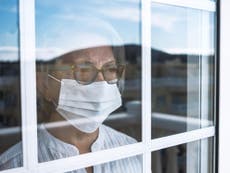Confusing ‘rule of six’ means physical AA meetings may not resume and addicts risk losing a vital lifeline
The government’s neglect to provide adequate clarity over rules for support groups shows a general ignorance about the danger of addiction

Your support helps us to tell the story
From reproductive rights to climate change to Big Tech, The Independent is on the ground when the story is developing. Whether it's investigating the financials of Elon Musk's pro-Trump PAC or producing our latest documentary, 'The A Word', which shines a light on the American women fighting for reproductive rights, we know how important it is to parse out the facts from the messaging.
At such a critical moment in US history, we need reporters on the ground. Your donation allows us to keep sending journalists to speak to both sides of the story.
The Independent is trusted by Americans across the entire political spectrum. And unlike many other quality news outlets, we choose not to lock Americans out of our reporting and analysis with paywalls. We believe quality journalism should be available to everyone, paid for by those who can afford it.
Your support makes all the difference.Alcoholics Anonymous will likely have to further postpone face-to-face meetings after restrictions in the UK tightened once again, making groups of six and over illegal. While you can continue to visit a pub, sharing toilet facilities with 30 plus other patrons, it is still unclear whether you are able to attend an AA meeting.
Whether the new rules are about political manoeuvring or a public health necessity, one thing is for sure – as faith in the government’s handling of the pandemic plummeted, they needed something. They needed a big distraction, something to refresh the nation’s fear, and seemingly offering a solution, so limiting groups to six or risk hefty sanctions was the iron fist they went for.
Like previous social distancing measures, the new restrictions are very unclear and confusing. While some face-to-face meetings may continue to run - the government recently updated its guidelines to include support groups such as the AA, despite Matt Hancock suggesting otherwise in an interview with Chris Evans last week - the majority of “fellowship” meetings will remain accessed via Zoom.
Meanwhile, shopping centres remain open, as does it seem anywhere where you can use your debit card. Again, this government favours commerce over human life, too short-sighted to see that this is where they have left the nation.
Britain is facing a surge in alcohol-related health problems following Covid-19 due to an increase in alcohol abuse during lockdown. Alcoholism is a valid mental illness that needs attention.
This time the government’s neglect to provide adequate clarity over rules for support groups is not about funding (AA is fully self-supporting), it’s due to a general ignorance about the danger of addiction, an illness that kills millions around the world every year and is on the increase.
Last week the male suicide rate hit a two-decade high in England and Wales. The ONS directly credited alcoholism and isolation as causes for the rise. The pandemic is taking its toll on people’s mental health and restricting access to AA meetings is taking away another vital resource for those struggling.
Zoom has served as an alternative, but it has limitations that could be fatal. In a video call there isn't the opportunity for “private” conversation and some members are increasingly concerned about how truly anonymous a Zoom call can be, aware they could be being filmed or screen-shotted. With alcoholism still misunderstood and stigmatised by vast swathes of society, and some employers, some members do not want to take the risk.
The biggest trigger for a relapse is proven to be loneliness, increased isolation can lead an addict to question the value of a life in recovery. Meanwhile, the peer support of a fellowship greatly increases the chances of an addict staying recovered. A relapsing addict that could have been prevented with the stability of a Fellowship will cost the government more money. AA is self-supported by its members and the new restrictions cut the government’s nose, and will certainly spite its face.
Alcoholics Anonymous is not a social club, it’s a lifeline for addicts and for some a meeting is as important as a hospital appointment. Alcoholics are not exceptional people worthy of special treatment, but they are vulnerable people in need of support.




Join our commenting forum
Join thought-provoking conversations, follow other Independent readers and see their replies
0Comments